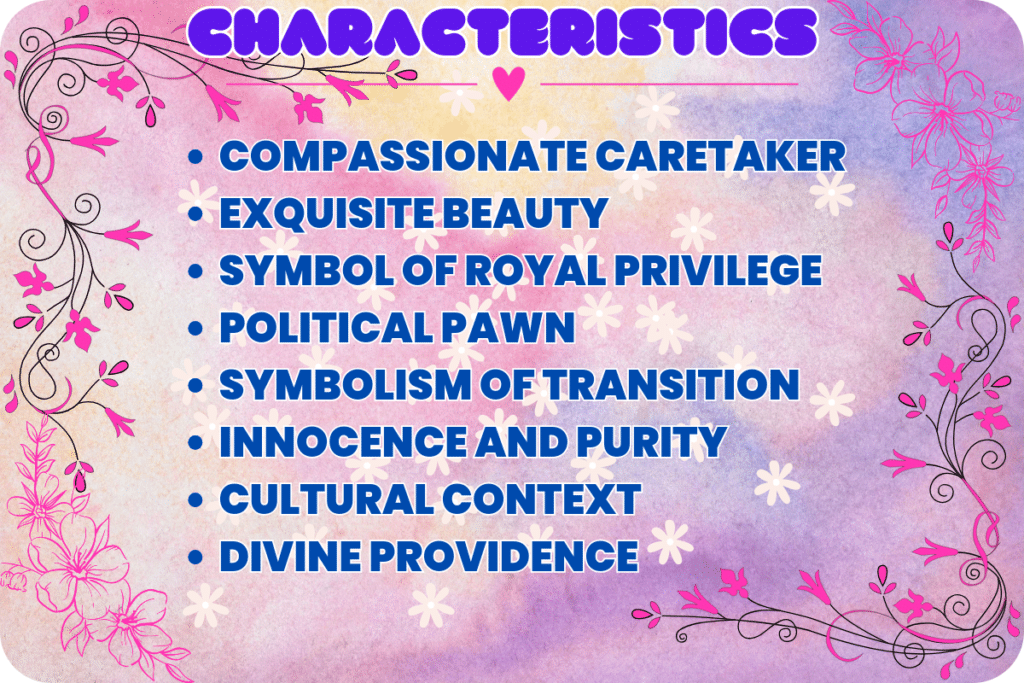ADMIRABLE ABISHAG IN THE BIBLE
In the Bible, the name Abishag is believed to mean “my father strays” or “my father is a wanderer.” Abishag in the Bible, a beautiful young woman, was brought to the aging King David to care for him in his final days.

Though their relationship remained non-sexual, her presence became a pawn in the power struggle between David’s sons Adonijah and Solomon. Abishag’s silence and servitude belied her importance as a witness to David’s designation of Solomon as heir.
Her story highlights God’s sovereignty in using even minor characters for His purposes. Abishag reminds us that every life has significance, and that faithfulness in ordinary tasks can have extraordinary impact. Her quiet presence shaped the course of Israel’s monarchy and the lineage of the Messiah.
Who is Abishag?
Abishag in the Bible, a Shunammite woman, was chosen to care for the aging King David in his final days without any sexual relationship. Her presence became pivotal in the power struggle between David’s sons, particularly Solomon and Adonijah, highlighting the political intrigue surrounding David’s succession.
Abishag’s role as a caregiver and witness to key events, like Solomon’s anointing as king, showcased God’s sovereignty in using even minor characters for His purposes. Despite her silence, Abishag’s significance lies in her unwitting involvement in shaping the course of Israel’s monarchy and the lineage of the Messiah.
Abishag’s Role in King David’s Life
Her Introduction in the Bible
Abishag in the Bible, a Shunammite woman, was brought to King David in his final days to provide warmth as he struggled to maintain body heat due to his declining health. Despite assumptions that she might become a concubine, there was no sexual relationship between them; her role was purely that of a caregiver attending to his needs.
Abishag’s presence became significant in the power struggle between David’s sons, particularly Solomon and Adonijah, showcasing the political intrigue surrounding David’s succession. Her story highlights God’s sovereignty in using even seemingly minor characters for His purposes.
Role as King David’s Caretaker
Abishag in the Bible, a beautiful young woman, was brought to the aging King David to provide warmth and care in his final days. Though their relationship remained non-sexual, her presence became pivotal in the power struggle between David’s sons Adonijah and Solomon.

Abishag’s role as a caregiver and witness to key events, like Solomon’s anointing as king, highlighted God’s sovereignty in using even minor characters for His purposes. Her story reminds us that every life has significance, and that faithfulness in ordinary tasks can have extraordinary impact.
Significance of Her Role
Abishag’s presence in King David’s chamber symbolizes the vulnerability of the once-mighty king in his final days, foreshadowing the power struggle among his sons for the throne. Despite her functional role as a caregiver, Abishag’s silent witness to pivotal events like Solomon’s anointing and Adonijah’s failed bid for the throne underscores the intricate power dynamics and political intrigue surrounding David’s succession, showcasing the significance of seemingly minor characters in shaping historical narratives.
The Biblical Account
Specific Scriptures Mentioning Abishag
Abishag in the Bible is specifically mentioned in, 1 Kings 1:1-4 and 1 Kings 2:13-25. Abishag, a young woman from Shunem, cared for King David in his final days, pivotal in the power struggle between his sons Adonijah and Solomon.
Adonijah’s request to marry her, seen as a bid for the throne, led to his downfall as Solomon ordered his execution. Abishag’s story exemplifies the significant role of minor characters in historical narratives.
Analysis of These Scriptures
Abishag, a beautiful young woman, became entangled in the political maneuvering of David’s successors. Her role as David’s caregiver and Adonijah’s request to marry her, seen as a bid for the throne, led to Adonijah’s downfall when Solomon ordered his execution. Abishag’s story exemplifies how minor characters can become central in royal succession.
Abishag’s Relationship with King David
Nature of Their Relationship
Abishag’s relationship with King David was indeed non-sexual, as explicitly stated in the scriptures. She served as a caregiver, providing warmth and care in his final days, rather than as a concubine, reflecting the customs and practicalities of the time.
Despite assumptions that she might become a concubine due to her beauty and proximity to the king, the scriptures clarify that her role was purely that of a caregiver attending to his needs.
Cultural Context of Her Role
In the ancient Near Eastern context, having a young, beautiful attendant like Abishag in the Bible was a symbol of the king’s power and privilege. Her presence at King David’s bedside highlighted his declining health and the impending transition of power.
Abishag’s role as a caregiver and witness to key events, such as David’s designation of Solomon as heir, underscored her significance in the power struggle surrounding the succession. Her story exemplifies how even minor characters can play crucial roles in shaping historical narratives.
Interpretations by Theologians
Abishag’s role as a caregiver to King David symbolizes purity, loyalty, and selfless service amidst the political turmoil of David’s succession. Her steadfast dedication and integrity, witnessed in pivotal events, highlight the enduring impact of faithfulness and devotion beyond the realm of political ambition and intrigue.
Abishag after David’s Death
Her Life Following David’s Demise
After King David’s death, Abishag in the Bible became embroiled in the power struggle between David’s sons Adonijah and Solomon. Adonijah, seeing Abishag’s beauty and proximity to the late king, sought to marry her as a means of asserting his claim to the throne.
However, Solomon recognized this as a veiled attempt to usurp his rightful kingship and ordered Adonijah’s execution. Abishag’s story highlights how even minor characters can become pawns in the political machinations of those seeking power.
The Proposal from Adonijah
Adonijah’s request to marry Abishag in 1 Kings 2:13-25 was a strategic move to legitimize his claim to the throne by asserting dominance and continuity of power in ancient Israel.
In that context, taking the king’s widow or concubine symbolized a claim to the throne, as it signified ownership of the previous king’s harem and implied a right to rule. Solomon’s swift action to execute Adonijah reflected the grave implications of such a move in the political landscape of that time.
Adonijah’s Request for Abishag
The Political Implications
Adonijah’s request to marry Abishag was not just personal but profoundly political. By seeking to wed Abishag, Adonijah aimed to strengthen his claim to the throne by leveraging her association with King David, symbolizing a direct challenge to Solomon’s kingship.

In the ancient Near Eastern context, taking possession of a deceased king’s harem, like Abishag in the Bible, was a strategic move to assert one’s right to rule, making Adonijah’s request a calculated political maneuver to legitimize his claim to the throne.
Solomon’s Response to the Request
Solomon, perceiving the threat in Adonijah’s request for Abishag as a veiled attempt to claim the throne, responded decisively by ordering Adonijah’s execution.
Viewing the proposal as an act of treason and a direct challenge to his reign, Solomon’s swift and decisive action reflected his commitment to maintaining his authority and thwarting any attempts to undermine his kingship, ensuring the stability of his rule.
Abishag in the Bible and the Succession to the Throne
How Her Story Influences the Succession Narrative
Abishag’s story in the succession narrative highlights the fragility of power transitions and the extreme measures contenders for the throne would take to secure their position. Her involvement, from caring for King David to becoming a pawn in the power struggle between Adonijah and Solomon, exemplifies the intricate dynamics and political intrigue surrounding royal successions in ancient Israel, showcasing how even seemingly minor characters can play crucial roles in shaping the course of history.
Implications for Solomon’s Reign
Solomon’s response to Adonijah’s request to marry Abishag showcased his political acumen and ruthlessness, establishing his authority and deterring further challenges to his rule. By swiftly ordering Adonijah’s execution, Solomon demonstrated his resolve to eliminate potential threats and consolidate his power, sending a clear message that any attempts to undermine his kingship would be met with decisive action, solidifying his position as the undisputed ruler.
Theological Interpretations of Abishag’s Story
Views from Different Theological Perspectives
The story of Abishag in the Bible is interpreted diversely by theologians. Some perceive her as a victim of political intrigue, caught in the power struggles of David’s successors. Others view her as a divine instrument in the establishment of Solomon’s reign, symbolizing the transition of power and the assertion of royal authority.
Her role reflects the complexities of human ambition and God’s sovereignty in shaping historical events, showcasing the interplay between personal agency and divine providence in biblical narratives.
Abishag in the Context of Divine Providence
In the context of divine providence, Abishag’s story is perceived as part of God’s plan to establish Solomon as king. Despite her passive role, Abishag’s presence and the events surrounding her, like Adonijah’s request and Solomon’s response, are integral to the unfolding of God’s will for Israel.
Through Abishag in the Bible, God orchestrates the political dynamics that lead to Solomon’s undisputed kingship, showcasing how even seemingly minor characters play crucial roles in fulfilling divine purposes in biblical narratives.
Lessons from Abishag in the Bible
The story of Abishag in the Bible offers several valuable lessons that can be gleaned from her character and experiences:
- Duty and Service: Abishag in the Bible exemplifies the virtues of duty and service through her role as a caretaker for King David. Despite the challenges and complexities of her position, she remains committed to fulfilling her responsibilities with compassion and diligence.
- Loyalty: Abishag’s loyalty to King David, even in his old age and infirmity, serves as a testament to the importance of loyalty in relationships. Despite the potential dangers and uncertainties surrounding her, she remains steadfast in her commitment to caring for the king.
- Humility: Despite her beauty and position in the royal court, Abishag in the Bible maintains a sense of humility and modesty. Her willingness to serve in a humble capacity reflects the importance of humility in the face of power and privilege.
- Navigating Political Intrigue: Abishag’s involvement in the political machinations of the royal family highlights the complexities of navigating political intrigue. Her story underscores the importance of discernment and wisdom in dealing with political forces and rivalries.
- Courage: In the face of adversity and uncertainty, Abishag in the Bible demonstrates courage and resilience. Despite being thrust into challenging circumstances, she faces them with strength and resolve, embodying the courage to confront difficult situations.
- Understanding Human Nature: Abishag’s experiences shed light on the complexities of human nature, including ambition, loyalty, and vulnerability. Her story serves as a reminder of the intricacies of human relationships and the often unpredictable dynamics at play.
- Acceptance of Fate: Ultimately, Abishag’s story illustrates the acceptance of fate and the recognition of one’s place within larger narratives. Despite her limited agency in the unfolding events, she accepts her role with grace and dignity, demonstrating resilience in the face of adversity.
- Faith in Divine Providence: For those who interpret the story of Abishag in the Bible, through a theological lens, her experiences may underscore the importance of faith in divine providence. Even amidst uncertainty and upheaval, trusting in God’s plan can provide strength and comfort.
Overall, the lessons learned from the story of Abishag in the Bible, encompass themes of duty, loyalty, humility, courage, and faith, offering timeless insights into the complexities of human existence and the enduring values that guide us through life’s challenges.
Legacy of Abishag in the Bible
Her Enduring Legacy in Biblical History
The legacy of Abishag in the Bible, endures as a figure who, despite her brief mention, plays a crucial role in the transition of power from King David to his son Solomon. Her story highlights the intricate tapestry of biblical history, where even minor characters can shape the course of events through their actions or proximity to power.
Abishag’s presence at David’s bedside and her involvement in the power struggle between Adonijah and Solomon underscore the fragility of power and the lengths to which contenders will go to secure their position.
Modern References and Influence
The story of Abishag in the Bible, continues to resonate today in various contexts, from biblical studies to cultural explorations. Her role as a caregiver to the aging King David and her entanglement in the power struggle between his sons highlight themes of beauty, loyalty, and the fragility of power. Abishag’s silence and servitude belie her significance as a witness to key events that shaped Israel’s monarchy. Her story exemplifies how even minor characters can play crucial roles in shaping historical narratives and serves as a testament to the enduring relevance of biblical figures.
Characteristics of Abishag in the Bible

Abishag in the Bible, as depicted in the Bible, possesses several notable characteristics that contribute to her significance in biblical narratives:
- Compassionate Caretaker: Abishag in the Bible is portrayed as a compassionate and dedicated caretaker, tasked with attending to the aging King David during his final years. Her role highlights qualities of empathy and service.
- Exquisite Beauty: Described as exceptionally beautiful, Abishag’s physical appearance plays a pivotal role in her story. Her beauty not only serves as a practical function in providing warmth to King David but also becomes a focal point in the political intrigues surrounding her.
- Symbol of Royal Privilege: As an attendant to the king, Abishag in the Bible symbolizes the privileges and luxuries associated with royalty. Her presence in David’s court underscores the opulence and prestige of the monarchy.
- Political Pawn: Despite her compassionate nature, Abishag in the Bible becomes embroiled in the power struggles within the royal family after David’s death. Her status as a political pawn is evident in Adonijah’s attempt to marry her to bolster his claim to the throne.
- Symbolism of Transition: Abishag’s role in David’s court marks a transition from the old guard to the new leadership under Solomon. Her presence signifies the passing of the torch and the changing dynamics within the kingdom of Israel.
- Innocence and Purity: Abishag’s character is often associated with themes of innocence and purity. Her untainted presence in the king’s chamber contrasts with the intrigue and corruption that surround her, further emphasizing her symbolic significance.
- Cultural Context: Abishag’s background as a maiden from Shunem adds cultural context to her character. Her humble origins juxtapose with her role in the royal court, highlighting the diverse societal strata within ancient Israel.
- Divine Providence: Some interpretations of Abishag’s story view her as an instrument of divine providence, playing a predetermined role in the establishment of Solomon’s reign. This perspective underscores her significance in the larger narrative of God’s plan for Israel.
Overall, Abishag in the Bible emerges as a multifaceted character in the Bible, embodying qualities of compassion, beauty, and symbolic importance within the political and cultural landscape of ancient Israel.
Common Misconceptions about Abishag in the Bible
Addressing Myths and Inaccuracies
The biblical text clarifies misconceptions about Abishag in the Bible, emphasizing her role as a caretaker to the aging King David. Despite assumptions that she might become a concubine or have a romantic relationship with David, the scriptures explicitly state that her duties were purely that of a caregiver, providing warmth and care without any sexual involvement. Abishag’s story underscores her significance as a caregiver rather than a romantic partner in David’s final day.
Clarifying Her True Biblical Role
Understanding Abishag’s true role as a caretaker, not a concubine or wife, is crucial in highlighting themes of service and loyalty over romantic or sexual entanglements. The biblical text clarifies that her duties were purely caregiving, emphasizing her loyalty to King David without any romantic involvement. Abishag’s story underscores the importance of selfless service and faithfulness in the face of political intrigue, showcasing her as a symbol of dedication and duty in biblical narratives.
Conclusion
The story of Abishag in the Bible, though concise, resonates with profound cultural, theological, and ethical implications. She embodies loyalty and service, entangled in the intricate web of royal politics, showcasing the transient nature of power and the enduring values of duty and care.
Abishag’s role as a caregiver to King David symbolizes selfless devotion amidst political intrigue, emphasizing timeless virtues of faithfulness and compassion. Her narrative serves as a poignant reminder of the complexities of human ambition and the enduring significance of humble service in the face of power struggles and shifting political landscapes.
Reference
Unique FAQ’s
Was Abishag married to King David? No, Abishag was not married to King David. She served as his caretaker during his final days but was not his wife or concubine.
Why did Adonijah want to marry Abishag? Adonijah wanted to marry Abishag to strengthen his claim to the throne. Marrying her, who was close to the late King David, would have symbolized a continuation of David’s royal line and bolstered his legitimacy.
What is the meaning of the name Abishag? The name Abishag is believed to mean “my father strays” or “my father is a wanderer,” reflecting her pastoral origins.
How does Abishag’s story reflect the culture of ancient Israel? Abishag’s story reflects the customs and practices of ancient Israel, where royal caretakers and attendants played significant roles. It also highlights the political intrigue and power struggles typical of monarchic transitions.
What lessons can modern readers learn from Abishag’s story? Modern readers can learn about the importance of loyalty, the complexities of political power, and the ethical dimensions of care and service from Abishag’s story. It offers insights into human nature and the timeless challenges of leadership and ambition.


1 thought on “38. ADMIRABLE ABISHAG IN THE BIBLE”